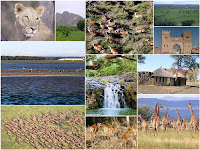Lucky Dube
 "The shining star of African reggae, Lucky Dube, made his first record in 1982, a Soul Brothers imitation produced by his cousin, singer Richard Siluma. Inspired by the public reaction to Jimmy Cliff's South African tours, Siluma then encouraged Dube to try his hand at the music he really loved, reggae. In 1987, when Afropop Worldwide first visited South Africa, Dube was on the verge of super-stardom, but he seemed like a loner. At big outdoor music festivals--the only permitted venues for popular acts at the time--Dube was the one reggae singer amid a sea of South African "disco" acts and established stars like Brenda Fassie, Stimela and the Soul Brothers. Dube waved a multi-colored scarf at the crowd, and in between every song, the band dropped into the vamp from Bob Maley's "No Woman, No Cry." The act showed promise, but also a hint of insecurity in its need to embrace the icon of international reggae so pointedly. Even as we watched, Dube's world was changing, and he wouldn't need any shoulders to climb on anymore.
"The shining star of African reggae, Lucky Dube, made his first record in 1982, a Soul Brothers imitation produced by his cousin, singer Richard Siluma. Inspired by the public reaction to Jimmy Cliff's South African tours, Siluma then encouraged Dube to try his hand at the music he really loved, reggae. In 1987, when Afropop Worldwide first visited South Africa, Dube was on the verge of super-stardom, but he seemed like a loner. At big outdoor music festivals--the only permitted venues for popular acts at the time--Dube was the one reggae singer amid a sea of South African "disco" acts and established stars like Brenda Fassie, Stimela and the Soul Brothers. Dube waved a multi-colored scarf at the crowd, and in between every song, the band dropped into the vamp from Bob Maley's "No Woman, No Cry." The act showed promise, but also a hint of insecurity in its need to embrace the icon of international reggae so pointedly. Even as we watched, Dube's world was changing, and he wouldn't need any shoulders to climb on anymore. As a school boy in apartheid South Africa, Dube worked as a library assistant at his secondary school. Contact with books and ideas established an early fascination with history and literature. It was there, in an encyclopedia entry, that he first learned about the Rastafari religion in Jamaica. Dube soon got his hands on a guitar and, along with Siluma, formed his first band, The Sky Way Band. Before following his heart to play reggae--always his favorite music--Dube released four albums of mbaqanga and Zulu traditional music.
Recorded in 1986, Dube's first reggae album, Rastas Never Die, was banned by the South African censors. It also upset his record company, Teal, which was busy marketing Dube as a Zulu traditional artist, especially after he had recorded a soundtrack for a semi-autobiographical 1984 film, "Getting Lucky." But Dube persisted, recording more reggae albums, first Think About the Children, and then in 1987, Slave. Its deeply resonant title song, Slave, was ostensibly about alcoholism, but its deeper idea about black people enslaved under apartheid was unmistakable. Slave quickly sold over 500,000 copies, and remained the top selling South African album for years to come. From there on, Dube and his band, The Slaves, could do no wrong.
In its low register, Dube's raspy voice invokes Peter Tosh, but Dube can also unleash a smooth, powerful falsetto to rival Smoky Robinson. Dube's tight grooves, passionate melodies and flutey keyboards have become a model for reggae bands throughout Africa. By 1991, Dube had usurped Ivory Coast's Alpha Blondy as the top man in African reggae, and was on his way to becomming one of the top-selling artists on the continent. A sure sign of his credentials, Dube has even won over the discerning crowd at Jamaica's annual Reggae Sunsplash festival. He toured the world promoting his next big-selling album, Prisoner, and the tour produced another bonanza, the live album, Captured Live.
In the dying days of South African apartheid, Dube pressed hard with a steady stream of concerts and recordings. He was embraced by reggae musicians world wide, and even by Peter Gabriel, who toured with Dube and featured him in the first American WOMAD festival in 1994. In 1996, won the prize for the Best Selling African Artist. In full celebration mode following the election of Nelson Mandela as president of South Africa, Dube was at the top of his form at home, around the continent, and all over the world.
Dube's 1997 release, Taxman found him turning his lyrical barbs on South Africa's new leaders, a trend that would continue with new force on his 2000 release, The Way it Is. That year, Dube told Afropop Worldwide, "A lot of people were thinking that once we had this black government, everything would be fine. Maybe we were only fighting the past government because it was a white government. But that's not the case with me. I was just fighting the system. It's the same now. If there's injustice or any sort of nonsense toward the people, I sing about that." From Afropop
More on Lucky Dube: Official Site, African Music Encyclopedia, WorldMusicCentral, The Economist, LeopardMan, AllAfrica, BBC, Google Music, Calabash, Safari Notes, Wikipedia, Amazon Music, Video
Site on African Music: Stanford.edu
Image: WorldMusicCentral


